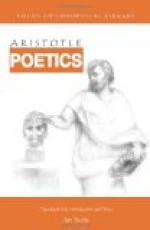Or, for {eta iota omicron nu epsilon sigma / beta omicron omicron omega rho iota nu, eta iota omicron nu epsilon sigma kappa rho alpha zeta omicron upsilon rho iota nu}
Again, Ariphrades ridiculed the tragedians for using phrases which no one would employ in ordinary speech: for example, {delta omega mu alpha tau omega nu / alpha pi omicron} instead of {alpha pi omicron / delta omega mu alpha tau omega nu}, {rho epsilon theta epsilon nu}, {epsilon gamma omega / delta epsilon / nu iota nu}, {Alpha chi iota lambda lambda epsilon omega sigma / pi epsilon rho iota} instead of (pi epsilon rho iota / ’Alpha chi iota lambda lambda epsilon omega sigma}, and the like. It is precisely because such phrases are not part of the current idiom that they give distinction to the style. This, however, he failed to see.
It is a great matter to observe propriety in these several modes of expression, as also in compound words, strange (or rare) words, and so forth. But the greatest thing by far is to have a command of metaphor. This alone cannot be imparted by another; it is the mark of genius, for to make good metaphors implies an eye for resemblances.
Of the various kinds of words, the compound are best adapted to Dithyrambs, rare words to heroic poetry, metaphors to iambic. In heroic poetry, indeed, all these varieties are serviceable. But in iambic verse, which reproduces, as far as may be, familiar speech, the most appropriate words are those which are found even in prose. These are,—the current or proper, the metaphorical, the ornamental.
Concerning Tragedy and imitation by means of action this may suffice.
XXIII
As to that poetic imitation which is narrative in form and employs a single metre, the plot manifestly ought, as in a tragedy, to be constructed on dramatic principles. It should have for its subject a single action, whole and complete, with a beginning, a middle, and an end. It will thus resemble a living organism in all its unity, and produce the pleasure proper to it. It will differ in structure from historical compositions, which of necessity present not a single action, but a single period, and all that happened within that period to one person or to many, little connected together as the events may be. For as the sea-fight at Salamis and the battle with the Carthaginians in Sicily took place at the same time, but did not tend to any one result, so in the sequence of events, one thing sometimes follows another, and yet no single result is thereby produced. Such is the practice, we may say, of most poets. Here again, then, as has been already observed, the transcendent excellence of Homer is manifest. He never attempts to make the whole war of Troy the subject of his poem, though that war had a beginning and an end. It would have been too vast a theme, and not easily embraced in a single view. If, again, he had kept it within moderate limits, it must




